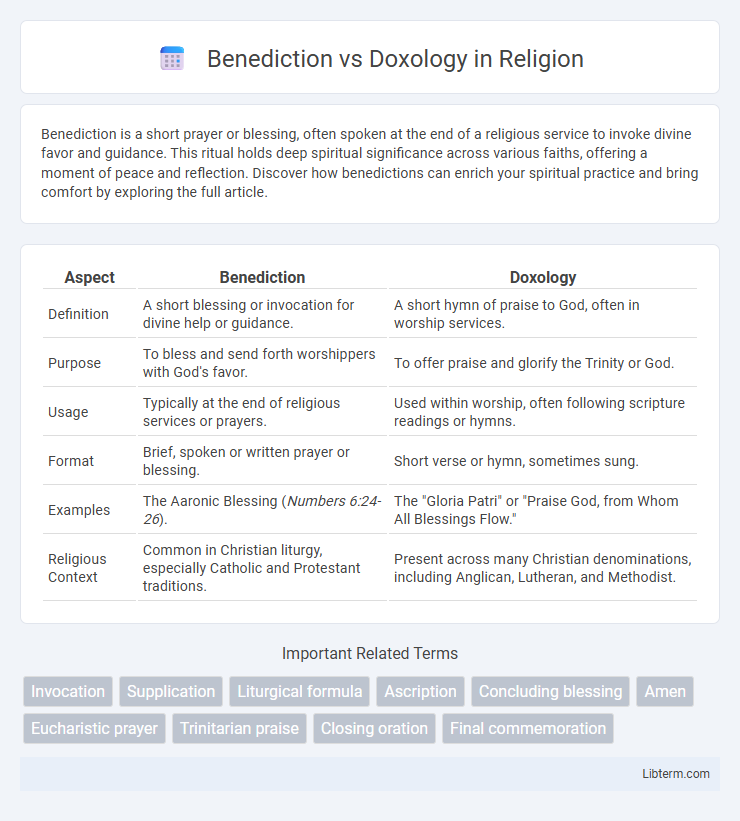Benediction is a short prayer or blessing, often spoken at the end of a religious service to invoke divine favor and guidance. This ritual holds deep spiritual significance across various faiths, offering a moment of peace and reflection. Discover how benedictions can enrich your spiritual practice and bring comfort by exploring the full article.
Table of Comparison
| Aspect | Benediction | Doxology |
|---|---|---|
| Definition | A short blessing or invocation for divine help or guidance. | A short hymn of praise to God, often in worship services. |
| Purpose | To bless and send forth worshippers with God's favor. | To offer praise and glorify the Trinity or God. |
| Usage | Typically at the end of religious services or prayers. | Used within worship, often following scripture readings or hymns. |
| Format | Brief, spoken or written prayer or blessing. | Short verse or hymn, sometimes sung. |
| Examples | The Aaronic Blessing (Numbers 6:24-26). | The "Gloria Patri" or "Praise God, from Whom All Blessings Flow." |
| Religious Context | Common in Christian liturgy, especially Catholic and Protestant traditions. | Present across many Christian denominations, including Anglican, Lutheran, and Methodist. |
Introduction to Benediction and Doxology
Benediction is a short invocation or blessing pronounced at the end of a religious service, aiming to confer divine favor and peace upon the congregation. Doxology, in contrast, is a liturgical expression of praise to God, often sung or recited, celebrating divine attributes and glory. Both elements play a significant role in Christian worship by reinforcing faith and communal worship experience.
Definitions: What is a Benediction?
A benediction is a short blessing or invocation of divine favor, typically delivered at the conclusion of a religious service to confer peace, protection, or grace upon the congregation. It often includes phrases asking for God's guidance, presence, or blessings in the lives of the worshippers. Unlike a doxology, which is a hymn of praise to the Trinity, a benediction serves as a closing prayer emphasizing spiritual well-being and divine support.
Definitions: What is a Doxology?
A doxology is a short hymn of praise to God, commonly used in Christian worship to express glorification and thanksgiving. It typically consists of a few lines emphasizing the divine nature of the Father, Son, and Holy Spirit, often recited or sung at the conclusion of prayers or hymns. Doxologies serve as formal liturgical formulas that encapsulate worshipers' acknowledgment of God's majesty and eternal power.
Historical Origins of Benedictions
Benedictions trace their origins to ancient religious rituals where priests pronounced blessings to invoke divine favor and protection, notably documented in Jewish traditions such as the Priestly Blessing found in the Book of Numbers. This historical foundation influenced early Christian liturgical practices, where benedictions became formal prayers invoking God's grace at the conclusion of worship services. The evolution of benedictions highlights their role as solemn, spoken blessings distinct from doxologies, which function primarily as hymns of praise within Christian worship.
Historical Development of Doxologies
Doxologies originated in early Christian worship as short hymns praising the Holy Trinity, evolving from Jewish liturgical traditions that emphasized glorifying God. By the 4th century, the Apostolic Tradition of Hippolytus documented structured doxologies, which spread through early church liturgies and were formalized in the Latin Mass during the medieval period. This historical development highlights the shift from spontaneous praise to prescribed, theologically rich recitations that shaped both Eastern Orthodox and Western Christian worship practices.
Key Differences Between Benediction and Doxology
Benediction is a short blessing typically given at the end of a religious service, invoking divine favor and protection for the congregation. Doxology, on the other hand, is a short hymn or expression of praise to God, often used to conclude worship with words of glorification and thanksgiving. The key difference lies in benediction's purpose of blessing versus doxology's focus on praise and worship.
Liturgical Uses of Benedictions
Benedictions in liturgical contexts serve as solemn blessings pronounced at the conclusion of worship services, invoking divine favor and protection upon the congregation. Unlike doxologies, which are short hymns of praise glorifying the Trinity, benedictions often involve scripted or spontaneous prayers that sanctify the assembly and commission members to carry out their faith in daily life. Common benedictions include the Aaronic Blessing (Numbers 6:24-26) and the priestly blessings in Christian and Jewish ceremonies, highlighting their role in creating a sacred closure to communal worship.
Liturgical Functions of Doxologies
Doxologies serve a crucial liturgical function by offering concise expressions of praise and worship to the Holy Trinity during Christian services. They are often recited or sung at key moments such as the conclusion of Psalms, prayers, or Scripture readings, reinforcing the communal aspect of worship. Benedictions, in contrast, typically function as blessings pronounced at the end of a service, signaling God's grace upon the congregation.
Examples in Scripture and Christian Worship
The Benediction often includes biblical blessings such as Numbers 6:24-26, "The Lord bless you and keep you," used in Christian worship to invoke God's favor and protection. Doxology refers to short hymns like the Gloria Patri ("Glory be to the Father, and to the Son, and to the Holy Spirit"), commonly sung in liturgical services to express praise and glorification of the Trinity. Both forms appear throughout scripture and worship practices, but Benedictions are primarily spoken blessings, while Doxologies are sung praises.
Significance and Impact on Modern Worship
Benediction and doxology hold distinct yet complementary roles in modern worship, with benediction serving as a solemn blessing imparted by clergy to conclude services, fostering a sense of divine presence and peace among congregants. Doxology, typically a short hymn of praise to the Trinity, energizes worship by encapsulating gratitude and reverence, often reinforcing communal identity and theological affirmations. The strategic use of benedictions and doxologies enhances liturgical structure, deepens spiritual engagement, and sustains theological continuity within contemporary Christian worship practices.
Benediction Infographic

 libterm.com
libterm.com